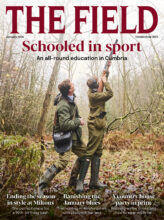The founder of the Northern Fishing School is determined to introduce as many people as possible to the magic of the sport
Having spent a childhood on the river bank, Marina Gibson has now founded the Northern Fishing School to introduce as many people as possible to the sport and it’s enormous physical and mental benefits.
For more sporting Dianas, seriously sporting ladies offering advice and encouragement, Megan Rowland hopes to ease new people’s way into deerstalking. And Rosie Whitaker learnt from a family of top shots and is passionate about encouraging the next generation into the field.
Keen to join our tradition? SUBSCRIBE to The Field and get your first six issues for JUST £6 by clicking on THIS link.
MARINA GIBSON
If you told me seven years ago that fishing would be my full-time career and I’d be running my own fishing school, I’d have laughed. I’m now 28 and incredibly excited to have started my new venture, The Northern Fishing School at Swinton estate in North Yorkshire. The school offers guided fishing and tuition, fishing courses accompanied by other activities such as yoga, cooking, falconry, golf, spa and more, school sessions and corporate days. I want to introduce as many people as possible to the magic of fishing – whatever their age – as the fun, affordable, perfect antidote to stress and the best way to escape the daily grind.

The school offers a wide range from fishing courses and tuition to yoga, cookery and falconry.
As a family we spent a lot of our time outdoors and on the banks of the river. My parents introduced me to fishing when I was five years old, starting with conventional tackle and eventually moving to fly-fishing. By eight, my brother and I were casting double-handed rods, both eagerly waiting to connect with the ‘King of fish’, the Atlantic salmon. It wasn’t until I was 11, fishing the River Oykel, that this moment arrived and I caught two in the space of 10 minutes. “This salmon fishing malarkey is a doddle,” I thought. Little did I know how tough this remarkable species could be.
My mother used to take us to our local fishery, Donnington Trout Farm. The manager taught us how to gut a fish and showed us that if the fish has just been killed the heart still pumps in your hands. These memories really stuck, although, sadly, it’s no longer a fishery.
During my teens, fishing took a backseat. But when my parents gave me rods for my 21st birthday I rediscovered the joy of fishing and found it grounding. I was longing to find something to take me out of London at weekends and fishing became my escape. During the week I would dream of my fishing adventures that coming weekend, bobbing up and down on Grafham Water or strolling along the banks of Syon Park lake.

Marina Gibson learnt on the riverbank as a child with her family.
When I met my now husband (we were married at Donnington Trout Farm), who felt the same about London, we decided to move to North Yorkshire, where he was brought up. I had passed my Level 1 and 2 Angling Trust Coaching exams and was qualified to teach and decided now was the time to turn my passion into a career. Fortunately, Orvis UK has supported me since 2015 and it has played a huge role in my success. In March 2018 I took my Fly Fishers International CI [casting instructor] exam and passed first time. I think exams are crucial to gain more knowledge, experience and respect.
Fishing days are all-consuming, from planning your trip to downloading the experiences from the day. It gets you off the sofa and away from tech, and is brilliant for families – young children pick it up quickly and learn how important our eco systems are.
Making the perfect cast and placing your fly in the right place takes time, persistence and effort. I think a lot of people still believe you need to be a certain type to fish: tough, uber-fit and strong – but you don’t. Casting is about technique, as well as finesse and timing, but that can be learnt through practice.
Many people ask: “Don’t you need patience to fish?” I always reply that you might need patience to learn how to fish in the beginning but once you’ve got over this hurdle the world is your oyster, you simply can’t get bored from that moment on.

Fishing has huge physical and mental benefits, requiring you to concentrate in a tranquil environment.
Fishing offers huge physical and mental benefits. It requires concentration but within a tranquil environment. There is a growing modern fishing community, made up of a younger, more diverse group of people, which I am glad to be part of. You can find them online, sharing their latest catch, as much as on the end of a line by a river. Thanks to the internet they’re already changing the way fishing is perceived and making it more inclusive. Social media has opened up the world of fishing – as an adrenaline-fuelled hobby, a fun way to get outdoors, to look after your wellbeing, build friendships and grow an awareness of the importance of conservation, getting back in touch with the natural world.
I’m not sure what I’d do without fishing. I’ve really found something that makes me happy and I am truly grateful for this.
TOP TIPS: I’ve experienced some online negativity. If you experience this in the future I’ve learnt NOT to react, take some time to breathe and call someone who will make you feel better. In the long term, you will be stronger and next time it happens it’ll be water off a duck’s back. If there is something you’d like to change in your life don’t wait, make a plan and set some deadlines, anything is possible if you work hard.





